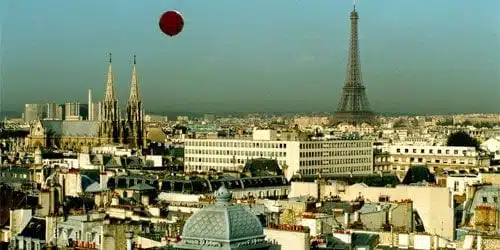
“I’m fairly easygoing,” says Suzanne (Juliette Binoche), “You don’t need to be formal.” Her off-screen voice trails over a point-of-view shot from inside a vehicle, making its way through a tunnel in Paris. In fact, actress and single mom Suzanne sounds anything but easygoing, and besides, you’ve just seen her at work, providing extravagant voice for a tragic puppet queen (“Alas! Alas! Alas!” she wails, accompanied by mournful oboe, “Since my despair is boundless, I will boil the ocean until no drop remains”). For her companion in the car and new employee, however, Suzanne needs to seem calm and in control. And so she performs.
In the next scene, Suzanne and Song (Song Fang) arrive at school to pick up seven-year-old Simon (Simon Iteanu). Mom looks on, still offering instructions and suggestions while Song and Simon recede along the sidewalk, getting to know one another. As quiet and observant as Suzanne is expressive and self-absorbed, Song is a film student from China. During her first conversation with Simon, she asks if he’s seen Albert Lamorisse’s The Red Balloon, the film that serves as point of departure for The Flight of the Red Balloon. “It’s a really old film,” she says, “from 1956.” The boy doesn’t know it, but he’s living something like it; similar to Pascal in the original, he’s followed through his day by a balloon, seemingly sentient, playful, emotional. The film opens as he’s speaking to it outside a metro stop, asking whether it will come home with him.
Unlike Pascal, however, Simon doesn’t have to explain the balloon to anxious adults, because no one else sees it. Song enlists the boy’s performance in her own homage to Lamorisse’s short. As they set up shots on the street, Song spots a mural of the balloon, the camera following her view as she points it out. At the same time, Simon remains aware of his balloon, hovering and tilting into the frame, floating near and then away from the picture of it. As the boy is also aware of his mother’s distractedness, he wants companionship and sanctuary. And so the balloon is again, some 33 years later, an emblem of such yearning, a gentle metaphor for innocence and hope.
In Hou Hsiao-hsien’s first French film, interactions are mirrored and refracted, images of images, reflections of longing. As Song shoots and edits her film and Simon plays video games, Suzanne — in the same room but also removed — frets over phone calls to her two-years-gone writer boyfriend in Montreal. He’s left her with a tenant downstairs who neglects to pay rent but also makes liberal use of her kitchen when he and his girlfriend throw dinner parties. “I used to be Suzanne’s cooker,” Marc (Hippolyte Girardot) tells Song by way of explaining (and also glossing over) his alleged privilege.
Listening to him, Song is taken aback, as if trying to parse the fine points of French intimacies and presumptions. After she insists on getting Suzanne’s permission by phone (Marc looking mildly bored by the extra step), Song watches the exchange (“I’m new here,” she explains to Marc, who nods, sort of). A conventional “outsider” in a wholly unconventional film, Song is further mystified when Suzanne comes home later and puts off Marc’s affable gestures; she stands in her bedroom, adjusting her hair as Marc fumbles just outside, his face obscured by the shimmery beads that function as her door. “Anything wrong?” he asks, as the camera focuses on Suzanne, jaw set.
Repeatedly framed by doorways and windows, each individual exists in a separate space, even as they also reach toward one another, earnestly if sometimes tentatively. Song’s filmmaking helps to set her apart, but it’s also her way into Suzanne and Simon’s experience. When she films the boy, Song is frequently reflected in windows, her image blurred, doubled, translucent. At the same time, Hou Hsiao-hsien’s signature long takes reveal details of behavior and desire as if by accident, watching Song watching Suzanne, watching Simon draw with big bright crayons. In one such take, while the women talk off-screen about scheduling, the camera studies Simon, patiently waiting at the dining table.
Suzanne is alternately fragile and fierce, her ups and downs simultaneously sympathetic and unnerving. When she pauses to take a breath, admiring Simon’s serene intelligence or confiding in Song as a friend more than an employee, Suzanne is transformed. Glimpsing Song’s movie on her laptop, Suzanne is moved, her focus shifting, however briefly, from her unknowable future to her forgotten past. “I found it very touching,” she says, “It reminded me of my childhood,” that is, her puppeteer grandfather and her own inspiration by his storytelling. A raconteur in his own right, Simon recalls an afternoon spent with his sister (Louise Margolin), now living with her father in Brussels.
The film slips here from the present into his past, Simon and Louise literally crossing a bridge, their chatter tender and silly. “She’s my pretend sister,” Simon tells Song, “because she’s not my real sister, because my parents divorced, that’s all I know.” As relationships and reflections slip into and out of one another, they are intoxicating and indefinable.

